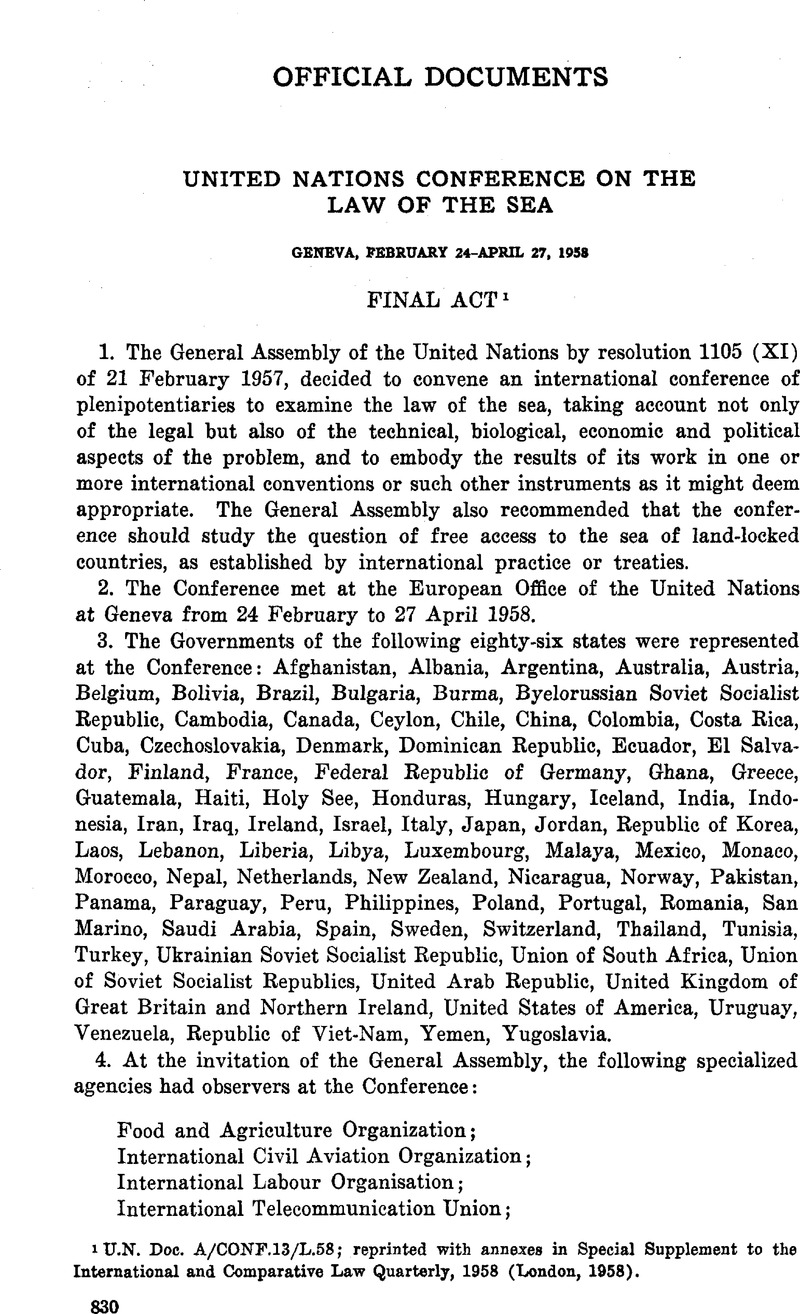Published online by Cambridge University Press: 28 March 2017

1 U.N. Doc. A/Conf.13/L.58; reprinted with annexes in Special Supplement to the International and Comparative Law Quarterly, 1958 (London, 1958).
1 The Final Act was signed by the representatives of all the states at the Conference except those for Belgium, Burma, Ireland, Jordan, Republic of Korea, Laos, Luxembourg, Malaya, Paraguay, Philippines, Saudi Arabia, Sweden, Bepublic of Viet-Nam and Yemen.
2 U.N. Doc. A/Conf.13/L.52; reprinted in 38 Dept. of State Bulletin 1111 (1958).
1 With a declaration as follows: “With respect to the Convention on the Territorial Sea and the Contiguous Zone, the delegation of Colombia declares that, under article 98 of the Colombian Constitution, authorization by the Senate is required for the passage of foreign troops through Colombian territory and that, by analogy, such authorization is accordingly also required for the passage of foreign warships through Colombian territorial waters.“
2 With reservation as follows: ” In signing the Convention on the Territorial Sea and the Contiguous Zone, I make the following reservation: “Article 14. The Iranian Government maintains the objection, on the ground of excess of competence, expressed by its delegation at the twelfth plenary meeting of the Conference on the Law of the Sea on 24 April 1958, to the articles recommended by the Fifth Committee of the Conference and incorporated in part in article 14 of this Convention. The Iranian Government accordingly reserves all rights regarding the contents of this article in so far as it relates to countries having no sea coast.“
3 U.N. Doc. A/Conf.13/L.53; reprinted in Dept. of State Bulletin, loc. cit. 1115.
1 With reservations as follow: ” In signing the Convention on the High Seas, I make the following reservations: “Article t. With respect to the words ‘no State may validly purport to subject any part of them to its sovereignty', it shall be understood that this prohibition does not apply to the continental shelf, which is governed by article 2 of the Convention on the Continental Shelf. “Articles 2, 3 and 4. The Iranian Government maintains the objection on the ground of excess of competence, expressed by its delegation at the twelfth plenary meeting of the Conference on the Law of the Sea on 24 April 1958, to the articles recommended by the Fifth Committee of the Conference and incorporated in the afore-mentioned articles of the Convention on the High Seas. The Iranian Government accordingly reserves all right regarding the contents of these articles in so far as they relate to countries having no sea coast. “Article 0(8)—article 16, paragraphs 1 and 2. Application of the provisions of these articles relating to the laying of submarine cables and pipelines shall be subject to the authorization of the coastal State, in so far as the continental shelf is concerned.''
2 U.N. Doc. A/Conf.13/L.54; reprinted in Dept. of State Bulletin, loc. cit. 1Z.
1 U.N. Doc. A/Conf.13/L.55; reprinted in Dept. of State Bulletin, loc. cit. 1121.
1 With reservations as follow: ” In signing this Convention on the Continental Shelf, I am instructed by the Iranian Government to make the following reservations: ” ( a ) Article 4: with respect to the phrase ‘the Coastal State may not impede the laying or maintenance of submarine cables or pipe-lines on the continental shelf, the Iranian Government reserves its right to allow or not to allow the laying or maintenance of submarine cables or pipe-lines on its continental shelf. ” ( b ) Article 6: with respect to the phrase ‘and unless another boundary line ie justified by special circumstances’ included in paragraphs 1 and 2 of this article, the Iranian Government accepts this phrase on the understanding that one method of determining the boundary line in special circumstances would be that of measurement from the high water mark.“
2 U.N. Doc. A/Conf.13/L.57; reprinted in Dept. of State Bulletin, loc. cit. 1123.
3 With reservation as follows: “In signing the Optional Protocol, the delegation of Colombia reserves the obligations of Colombia arising out of conventions concerning the peaceful settlement of disputes which Colombia has ratified and out of any previous conventions concerning the same subject which Colombia may ratify.“